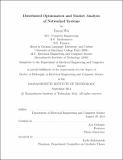| dc.contributor.advisor | Asu Ozdaglar. | en_US |
| dc.contributor.author | Wei, Ermin | en_US |
| dc.contributor.other | Massachusetts Institute of Technology. Department of Electrical Engineering and Computer Science. | en_US |
| dc.date.accessioned | 2015-01-20T15:30:48Z | |
| dc.date.available | 2015-01-20T15:30:48Z | |
| dc.date.copyright | 2014 | en_US |
| dc.date.issued | 2014 | en_US |
| dc.identifier.uri | http://hdl.handle.net/1721.1/92968 | |
| dc.description | Thesis: Ph. D., Massachusetts Institute of Technology, Department of Electrical Engineering and Computer Science, 2014. | en_US |
| dc.description | This electronic version was submitted by the student author. The certified thesis is available in the Institute Archives and Special Collections. | en_US |
| dc.description | Cataloged from student-submitted PDF version of thesis. | en_US |
| dc.description | Includes bibliographical references (pages 173-179). | en_US |
| dc.description.abstract | In the interconnected world of today, large-scale multi-agent networked systems are ubiquitous. This thesis studies two classes of multi-agent systems, where each agent has local information and a local objective function. In the first class of systems, the agents are collaborative and the overall objective is to optimize the sum of local objective functions. This setup represents a general family of separable problems in large-scale multi-agent convex optimization systems, which includes the LASSO (Least-Absolute Shrinkage and Selection Operator) and many other important machine learning problems. We propose fast fully distributed both synchronous and asynchronous ADMM (Alternating Direction Method of Multipliers) based methods. Both of the proposed algorithms achieve the best known rate of convergence for this class of problems, O(1/k), where k is the number of iterations. This rate is the first rate of convergence guarantee for asynchronous distributed methods solving separable convex problems. For the synchronous algorithm, we also relate the rate of convergence to the underlying network topology. The second part of the thesis focuses on the class of systems where the agents are only interested in their local objectives. In particular, we study the market interaction in the electricity market. Instead of the traditional supply-follow-demand approach, we propose and analyze a systematic multi-period market framework, where both (price-taking) consumers and generators locally respond to price. We show that this new market interaction at competitive equilibrium is efficient and the improvement in social welfare over the traditional market can be unbounded. The resulting system, however, may feature undesirable price and generation fluctuations, which imposes significant challenges in maintaining reliability of the electricity grid. We first establish that the two fluctuations are positively correlated. Then in order to reduce both fluctuations, we introduce an explicit penalty on the price fluctuation. The penalized problem is shown to be equivalent to the existing system with storage and can be implemented in a distributed way, where each agent locally responds to price. We analyze the connection between the size of storage, consumer utility function properties and generation fluctuation in two scenarios: when demand is inelastic, we can explicitly characterize the optimal storage access policy and the generation fluctuation; when demand is elastic, the relationship between concavity and generation fluctuation is studied. | en_US |
| dc.description.statementofresponsibility | by Ermin Wei. | en_US |
| dc.format.extent | 179 pages | en_US |
| dc.language.iso | eng | en_US |
| dc.publisher | Massachusetts Institute of Technology | en_US |
| dc.rights | M.I.T. theses are protected by copyright. They may be viewed from this source for any purpose, but reproduction or distribution in any format is prohibited without written permission. See provided URL for inquiries about permission. | en_US |
| dc.rights.uri | http://dspace.mit.edu/handle/1721.1/7582 | en_US |
| dc.subject | Electrical Engineering and Computer Science. | en_US |
| dc.title | Distributed optimization and market analysis of networked systems | en_US |
| dc.type | Thesis | en_US |
| dc.description.degree | Ph. D. | en_US |
| dc.contributor.department | Massachusetts Institute of Technology. Department of Electrical Engineering and Computer Science | |
| dc.identifier.oclc | 900009042 | en_US |
